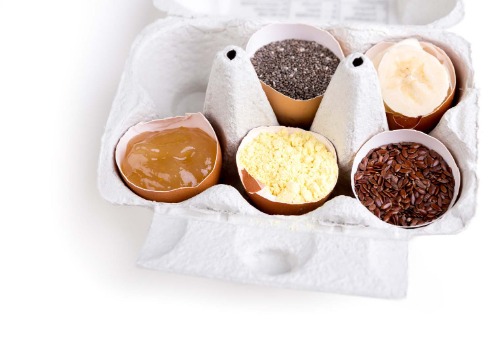Smart Swaps for Eggs in the Kitchen

Photo: Adobe Stock
In the past few months, the cost of eggs has doubled in much of the U.S., leaving many shoppers searching for alternative options. Whether it’s due to supply chain issues, avian flu outbreaks, or seasonal demand, eggs are sometimes hard to find or just too expensive to keep stocked in the fridge. Good news though, even if you didn’t start your own flock of egg laying hens this year, there are plenty of easy, nutritious, and effective alternatives to eggs, especially if you know what role eggs play in a recipe.
Learn more about how eggs function in cooking and baking, practical substitutes based on what you’re making, and tips to keep meals delicious and affordable, without cracking a single shell.
What do eggs do in a recipe?
Eggs are more than just an ingredient – they’re kitchen multitaskers. Understanding what they do helps to pick the right replacement.
In cooking (a primary ingredient in a dish):
- Eggs serve as the centerpiece of dishes like omelets, scrambles, and frittatas.
- Fat, protein, and emulsifiers make eggs a filling and satisfying option.
In baking (mixed with other ingredients before heating and eating):
- Binding: Eggs hold ingredients together and give baked goods structure (meatloaf).
- Moisture: Egg liquid is absorbed into other ingredients, contributing to tenderness (custard).
- Leavening: Eggs can trap air, helping muffins, cakes, and pancakes rise (sponge cake).
- Texture and appearance: Eggs add color, support browning, and carry flavor (brioche bread).
Nutritional value of eggs
Eggs pack a nutritional punch, including:
- Complete protein: Contains all essential amino acids that the body can’t produce by itself, supporting muscle growth, repair, and overall health.
- Healthy fats: Including mono- and polyunsaturated fats that help lower bad cholesterol and reduce the risk of heart disease.
- Cholesterol: Though high in cholesterol, research shows that most people can eat eggs without affecting blood cholesterol levels.
- Vitamins and minerals: Rich in vitamins A, D, E, several B vitamins, and nutrients like choline, iron, selenium, and phosphorus, supporting immune function, nerve function, bone health, and more.
How to replace eggs based on their role
Much like eggs, these substitutions are not exclusive to just one role in cooking or baking. Consider what roles the egg may play in a recipe in terms of taste, texture, structure, and nutrition to find the best alternative.
1. Substitutes for whole eggs in cooking
Best for scrambles, quiches, or baked casseroles:
- 1 egg = 1½ tsp commercial egg replacer powder + 2-3 tbsp warm water
- 1 egg = ¼ cup silken tofu (pureed)
- 1 egg = ¼ cup pureed lentils (split peas or moong dal) with water or milk
2. Leavening substitutes (help baked goods rise)
Use these in cakes, muffins, or pancakes:
- 1 egg = 1 tsp baking soda + 1 tbsp vinegar or lemon juice
- 1 egg = 1 tsp baking powder + 1½ tbsp water + 1½ tbsp oil
3. Moisture substitutes (for texture, can impact flavor)
Best for brownies, cakes, or quick breads:
- 1 egg = ¼ cup mashed banana, applesauce, yogurt, pureed pumpkin, mashed potato, or nut butter
4. Binding substitutes (hold ingredients together)
Use in veggie burgers, loaves, or cookies:
- 1 egg = 1 tbsp ground flaxseed or chia + 3 tbsp water (let sit until gelled)
- 1 egg = ¼ cup aquafaba/chickpea water (or 2 tbsp for egg whites only)
- 1 egg = 1 tbsp soy lecithin (best egg yolk replacement)
- 1 egg = 1 tbsp cornstarch (limit to 1 in 3 eggs replaced)
Nutrition from egg substitutes
Depending on the substitute, you can still get important nutrients:
Substitute |
Key Nutritional Contents |
| Flax or chia seeds | Omega-3 fatty acids (α-linolenic acid), dietary fiber, plant-based protein, antioxidants (chlorogenic acid, caffeic acid, and quercetin) |
| Silken tofu | Higher protein quality, iron, calcium (fortified) |
| Mashed banana/Applesauce | Natural sugars (fructose and glucose), fiber, vitamins (B6 and C) and minerals (potassium, phosphorus, and calcium) |
| Yogurt/Cottage cheese | Higher protein quality, phosphorus, potassium, calcium and vitamins A, B2, and B12, probiotics |
| Nut butters | Healthy fats, protein, minerals (calcium, potassium, magnesium, selenium, and zinc.) |
| Aquafaba (chickpea water) | Low-calorie, some plant-based proteins and starches |
Conclusion
Culinary creations don’t have to suffer if eggs are expensive or unavailable. With
a little creativity and the right substitutes, meals can be satisfying and budget-friendly
– no eggs required.
QUICK TIPS FOR CHOOSING THE RIGHT CULINARY SUBSTITUTE
|
Brianna Routh, PhD, RDN is an MSU Extension Food and Family Specialist.
